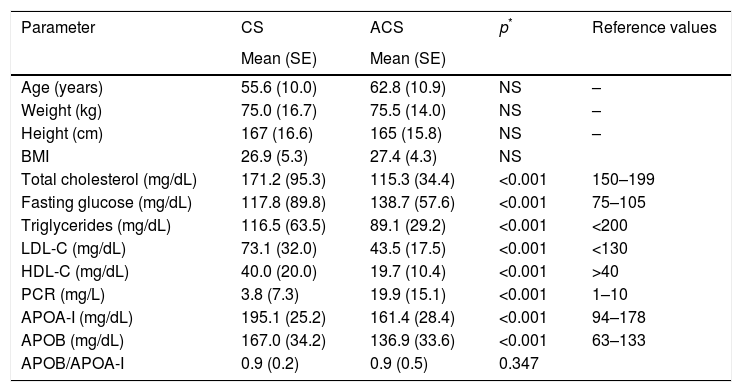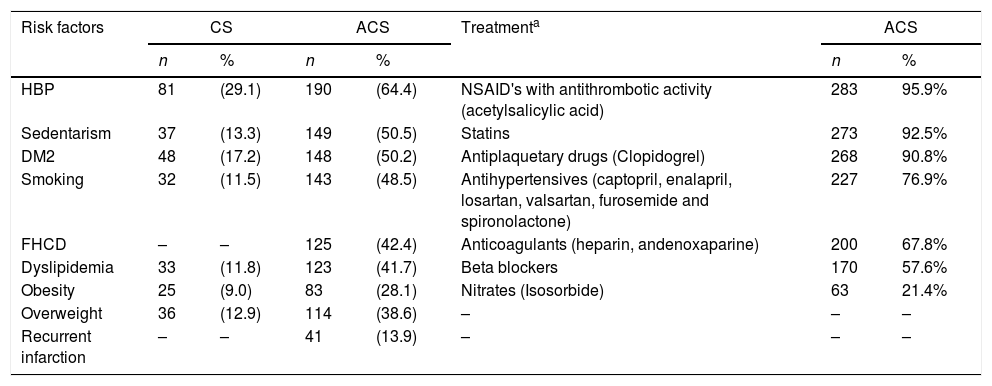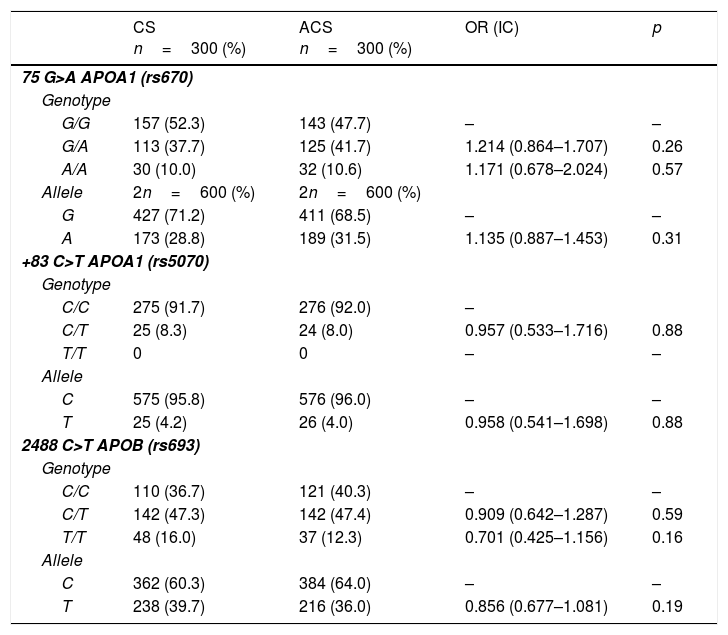Lipid metabolism alterations contribute to acute coronary syndrome (ACS). rs670, rs5070 and rs693 polymorphisms have shown to modify the risk of cardiovascular disease. Apolipoprotein A-I (ApoA-I) plays a major role in reverse cholesterol transport; apolipoprotein B (ApoB) contributes to accumulation of cholesterol in the plaque. The aim of this study was to investigate the association of rs670 and rs5070 polymorphisms of APOA1 and rs693 polymorphism of APOB with ACS and circulating levels of its proteins and find if ApoB/ApoA-I could be implemented as an independent parameter of risk for cardiovascular disease and as a biomarker of lipid-lowering therapy effectiveness in Mexican population.
MethodsThree hundred patients with ACS and 300 control subjects (CS) were included.
ResultsNeither genotype nor allele frequencies of rs670, rs5070 and rs693 polymorphisms showed statistical differences between groups. Serum levels of ApoA-I (195 vs. 161.4mg/dL; p<.001) and ApoB (167 vs. 136.9mg/dL; p<.001) were significantly higher in CS compared with ACS; however, there was no genetic association. Unstable angina patients showed the highest ApoA-I levels (males: 176.3mg/dL; females: 209.1mg/dL).
ConclusionThe rs670, rs5070 and rs693 polymorphisms are not genetic susceptibility factors for ACS in Mexican population and had no effect on their apolipoprotein concentrations. In our population, ApoA-I, ApoB and HDL-C could be better biomarkers of cardiovascular risk and could indicate if statins doses reduce atherogenic particles properly.
Las alteraciones en el metabolismo de los lípidos contribuyen al síndrome coronario agudo (SCA). Se ha demostrado que los polimorfismos rs670, rs5070 y rs693 modifican el riesgo de enfermedad cardiovascular. La apolipoproteína A-I (ApoA-I) desempeña un papel principal en el transporte inverso del colesterol; la apolipoproteína B (ApoB) contribuye a la acumulación de colesterol en la placa. El objetivo de este estudio fue investigar la asociación entre los polimorfismos rs670 y rs5070 de APOA1 y el polimorfismo rs693 de APOB con SCA y los niveles circulantes de estas proteínas, e investigar si ApoB/ApoA-I podría introducirse como parámetro independiente predictor de riesgo de la enfermedad cardiovascular y como biomarcador del tratamiento de reducción de lípidos en la población mexicana.
MétodosSe incluyó a 300 pacientes con SCA y 300 sujetos control (SC).
ResultadosNi las frecuencias genotípicas ni las alélicas de los polimorfismos rs670, rs5070 y rs693 reflejaron diferencias estadísticamente significativas entre los grupos. Los niveles séricos de ApoA-I (195 frente a 161,4mg/dl; p<0,001) y ApoB (167 frente a 136,9mg/dl; p<0,001) fueron significativamente superiores en los SC en comparación con los SCA; sin embargo, no existió asociación genética. Los pacientes con angina inestable reflejaron los niveles más elevados de ApoA-I (varones: 176,3mg/dl; mujeres: 209,1mg/dl).
ConclusiónLos polimorfismos rs670, rs5070 y rs693 no constituyen factores de susceptibilidad genética para SCA en la población de México y no tienen efecto sobre las concentraciones de sus apolipoproteínas. En nuestra población, ApoA-I, ApoB y c-HDL podrían constituir unos mejores biomarcadores del riesgo cardiovascular, y podrían indicar si las dosis de estatinas reducen debidamente las partículas aterogénicas.
Artículo
Comprando el artículo el PDF del mismo podrá ser descargado
Precio 19,34 €
Comprar ahora












